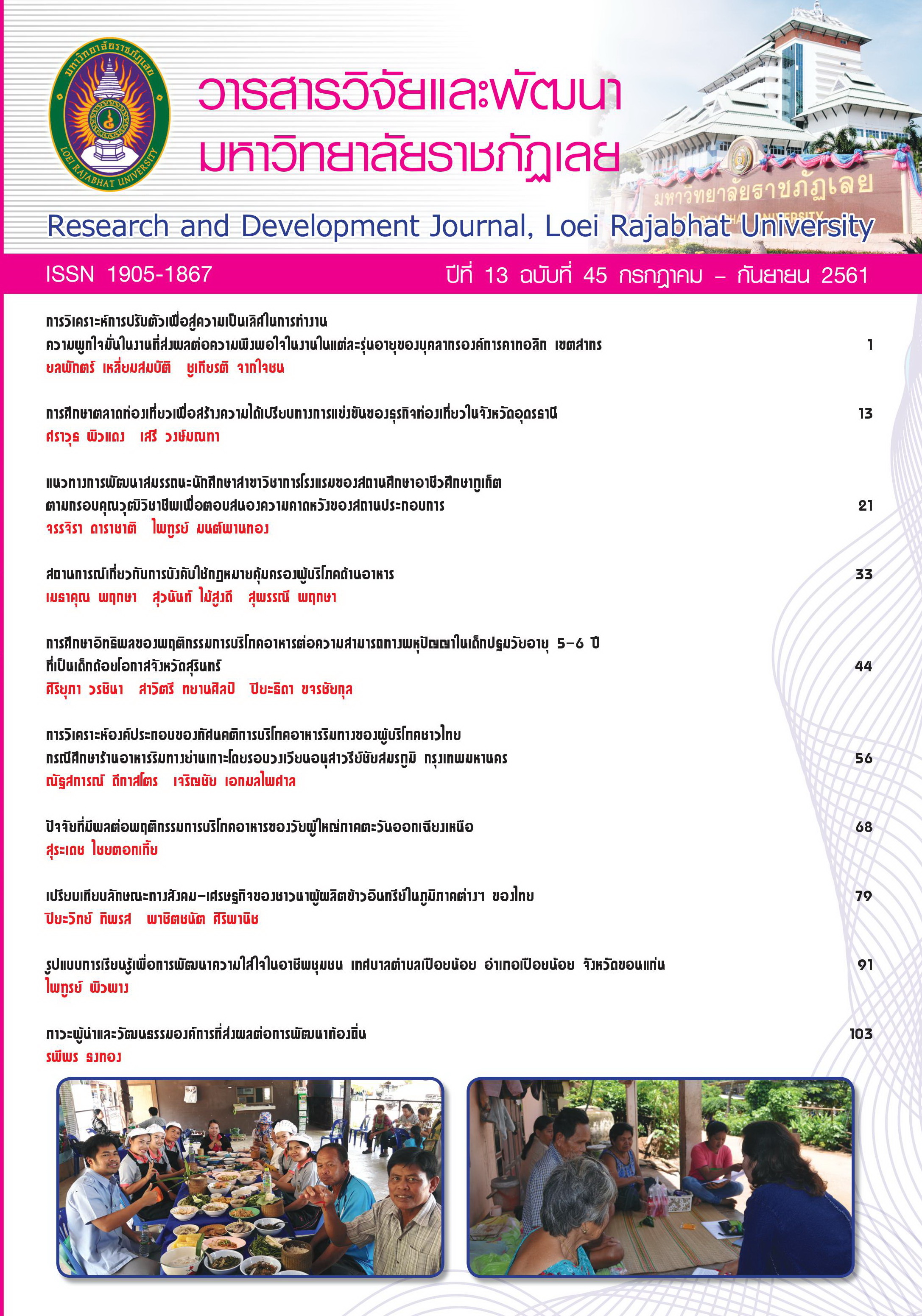ภาวะผู้นำและวัฒนธรรมองค์การที่ส่งผลต่อการพัฒนาท้องถิ่น
Keywords:
ภาวะผู้นำ, วัฒนธรรมองค์กร, การพัฒนาท้องถิ่น, leadership, organization culture, local developmentAbstract
งานวิจัยนี้วัตถุประสงค์เพื่อ 1) เพื่อศึกษาระดับภาวะผู้นำ วัฒนธรรมองค์การ และการพัฒนาท้องถิ่น ในภาคตะวันออกเฉียงเหนือตอนบน 2) เพื่อศึกษาความสัมพันธ์ระหว่างภาวะผู้นำและวัฒนธรรมองค์การในภาคตะวันออกเฉียงเหนือตอนบน 3) เพื่อศึกษาภาวะผู้นำและวัฒนธรรมองค์การส่งผลต่อการพัฒนาท้องถิ่นในภาคตะวันออกเฉียงเหนือตอนบน 4) เพื่อศึกษาแนวทางพัฒนาภาวะผู้นำและวัฒนธรรมองค์การที่มีผลต่อการพัฒนาท้องถิ่นในภาคตะวันออกเฉียงเหนือตอนบน ใช้วิธีวิจัยแบบผสาน ทั้งระเบียบวิธีวิจัยเชิงคุณภาพ และระเบียบวิธีวิจัยเชิงปริมาณ โดยใช้แบบสอบถามเก็บรวบรวมความคิดเห็นของกลุ่มตัวอย่าง จำนวน 340 คน และใช้การสัมภาษณ์ผู้ทรงคุณวุฒิจำนวน 12 คน แล้วนำผลมาวิเคราะห์หาคำตอบตามวัตถุประสงค์การวิจัย ผลวิจัยพบว่า 1) ระดับภาวะผู้นำในภาคตะวันออกเฉียงเหนือตอนบนโดยรวมอยู่ในระดับมากที่สุด เมื่อพิจารณาเป็นรายด้านพบว่า ด้านที่มีค่าเฉลี่ยมากที่สุด คือ ภาวะผู้นำแบบมีอิทธิพลอย่างมีอุดมการณ์ รองลงมา คือ ผู้นำแบบสร้างแรงบันดาลใจ และด้านที่มีค่าเฉลี่ยน้อยที่สุด คือ ผู้นำแบบคำนึงถึงความเป็นปัจเจกบุคคล, สภาพวัฒนธรรมองค์การในภาคตะวันออกเฉียงเหนือตอนบน โดยรวมอยู่ในระดับมากที่สุด เมื่อพิจารณาเป็นรายด้านพบว่าด้านที่มีค่าเฉลี่ยมากที่สุด คือ วัฒนธรรมองค์การแบบครอบครัว รองลงมา คือ วัฒนธรรมองค์การแบบเน้นการพัฒนา และด้านที่มีค่าเฉลี่ยน้อยที่สุด คือ วัฒนธรรมองค์การแบบเน้นสายการบังคับบัญชา 2) วัฒนธรรมองค์การมีความสัมพันธ์ไปในทิศทางบวกกับภาวะผู้นำ โดยมีค่า r = .314 อย่างมีนัยสำคัญทางสถิติที่ระดับ .01 3) ภาวะผู้นำและวัฒนธรรมองค์การส่งผลต่อพัฒนาท้องถิ่นและภาวะผู้นำและวัฒนธรรมองค์การมีความสามารถในการพยากรณ์ร้อยละ 33.7% (R2 = .337) อย่างมีนัยสำคัญทางสถิติที่ระดับ .01 4) ข้อค้นพบควรใช้กะบวนการ PDCA มาใช้ในการพัฒนาภาวะผู้นำกับวัฒนธรรมองค์การ เพื่อให้เกิดการพัฒนาท้องถิ่นอย่างมีประสิทธิภาพและเกิดความยั่งยืน
The objective of this research aimed; 1) to study the level of the leadership and organization culture affecting local development in the Upper-Northeaste; 2) to study the relationship among the concepts of the leadership and organization culture in the Upper-Northeaste; 3) to study the leadership and organization culture affecting local development in the Upper-Northeaste by using the merge method Qualitative Research Methodology And quantitative research methods. 4) to study the development approach the
leadership and organization culture affecting local development. The researcher data collected amount 340 people by questionnaire and to analysis results supported with interviews 12 qualified persons.
The results of the research were found as follow: 1) The leadership levels in the Upper-Northeaste in the overall aspect was at high level. The most satisfaction was Idealized influence followed by the Inspirational motivation and the minimum was Individual consideration, Organization culture factor in the overall aspect was at high level. the most satisfaction was clan culture followed by the develop-mental culture and the minimum was hierarchy culture, Organization culture factors has relationship is in the same direction at medium level with the leadership factor; 2) the statistically significant .01 positive associations were found among the leadership and organization culture at r = .314; 3) the leadership and organization culture affecting local development at 33.7% (R2 = .337) statistically significant. 01. 4) Fact findings of development approach the leadership and organization culture affecting local development need to be using PDCA process for contributes to sustainable local development.
References
ณัฏฐพงศ์ ทองภักดี. (2550). ปรัชญาของเศรษฐกิจพอเพียง : ความเป็นมาและความหมายปรัชญาเศรษฐกิจพอเพียงกับการบริหารการพัฒนา. กรุงเทพฯ: สถาบันบัณฑิตพัฒนบริหารศาสตร์.
บุษบง ชัยเจริญวัฒนะ และบุญมี ลี้. (2544). รายงานการวิจัยตัวชี้วัดธรรมาภิบาล. กรุงเทพฯ: สถาบันพระปกเกล้า.
บรรเจิด เจริญเวช. (2552). ยุทศาสตร์การบริหารจัดการขององค์กรปกครองส่วนท้องถิ่นที่ได้รับรางวัลองค์กรปกครองส่วนท้องถิ่นที่มีการบริหารจัดการที่ดี: กรณีศึกษาองค์กรปกครองส่วนท้องถิ่นที่มีการบริหารจัดการ ที่ดี พ.ศ. 2548 จังหวัดสุราษฏร์ธานี. วารสารการพัฒนาท้องถิ่น, 4(1). 176-188.
พิชาย รัตนดิลก ณ ภูเก็ต. (2550). ภาวะผู้นำและแนวทางเชิงปฏิบัติสำหรับผู้บริหารส่วนท้องถิ่นภายใต้บริบทแห่งการเปลี่ยนแปลง. วารสารการพัฒนาท้องถิ่น, 2(1), 121-148.
ภิรมย์พร ไชยยนต์. (2557). การกระจายอำนาจการปกครองท้องถิ่น : ศึกษากรณีการปกครองตนเองตามเจตนารมณ์ของประชาชนในระดับจังหวัด. (วิทยานิพนธ์ปริญญานิติศาสตรมหาบัณฑิต สาขาวิชานิติศาสตร์). กรุงเทพฯ: สถาบันบัณฑิตพัฒนบริหารศาสตร์.
มานิตย์ เมธานุภาพ. (2551). การศึกษาความสัมพันธ์ระหว่างวัฒนธรรมองค์การกับการปฏิบัติงานด้านการประกันคุณภาพการศึกษาของสถานศึกษา สังกัดสำนักงานเขตพื้นที่การศึกษาตาก เขต 2. (วิทยานิพนธ์ปริญญาครุศาสตรมหาบัณฑิต สาขาวิชาการบริหารการศึกษา). กำแพงเพชร : บัณฑิตวิทยาลัย มหาวิทยาลัยราชภัฎกำแพงเพชร.
วุฒิสาร ตันไชย และธีรพรรณ ใจมั่น. (2547). พระราชบัญญัติกำหนดแผนและขั้นตอนการกระจายอำนาจให้แก่องค์กรปกครองส่วนท้องถิ่น พ.ศ. 2542. ใน สารานุกรมการปกครองท้องถิ่นไทย สถาบันพระปกเกล้า. นนทบุรี : สถาบันพระปกเกล้า.
สมบัติ บุญเลี้ยง, อารีย์ นัยพินิจ และธงพล พรหมสาขา ณ สกลนคร. (2555). ลักษณะภาวะของผู้นำที่ดีในการบริหารองค์กรปกครองส่วนท้องถิ่น. วารสารมนุษยศาสตร์ สังคมศาสตร์, 29 (2), 97-112.
สำนักงานข้าราชการพลเรือน. (2553). ประสิทธิภาพขององค์กรปกครองส่วนท้องถิ่น. กรุงเทพฯ: กรมส่งเสริมการปกครองท้องถิ่น กระทรวงมหาดไทย.
สุดจิต นิมิตรกุล. (2543). กระทรวงมหาดไทยกับการบริหารจัดการที่ดีในการปกครองที่ดี (Good Governance). กรุงเทพฯ: บพิธการพิมพ์.
สุเทพ พงศ์ศรีวัฒน์. (2550). ภาวะความเป็นผู้นำ : เอกสารตำราหลักประกอบการเรียนการสอนหลักสูตรรัฐประศาสนศาสตรบัณฑิต สาขาการปกครองท้องถิ่น. กรุงเทพฯ: เอ็กซ์เปอร์เน็ท.
สำนักงานโครงการพัฒนาแห่งสหประชาชาติ. (2550). รายงานการพัฒนาคนของประเทศไทย ปี 2550 เศรษฐกิจพอเพียงกับการพัฒนาคน. กรุงเทพฯ: สำนักงานโครงการพัฒนาแห่งสหประชาชาติ.
สำนักนายกรัฐมนตรี. (2542). ระเบียบสำนักนายกรัฐมนตรีว่าด้วยการสร้างระบบบริหารกิจการบ้านเมืองและสังคมที่ดี พ.ศ. 2542 (2542, 10 สิงหาคม). ราชกิจจานุเบกษา. เล่ม 116 (ตอนที่ 63 ง).
อภิสิทธิ์ คิดโสดา. (2553). ความสัมพันธ์ระหว่างวัฒนธรรมองค์กรกับสมรรถนะการทำงานของพนักงาน ลูกจ้างประจำ และลูกจ้างในสังกัดที่ทำการไปรษณีย์ จังหวัดสกลนคร. (วิทยานิพนธ์ปริญญารัฐประศาสนศาสตรมหาบัณฑิต สาขาวิชารัฐประศาสนศาสตร์). สกลนคร: บัณฑิตวิทยาลัย มหาวิทยาลัยราชภัฎสกลนคร.
อรพินท์ สพโชคชัย. (2547). การบริหารจัดการบ้านเมืองที่ดี : แนวคิดและประสบการณ์ในภาคราชการไทย ใน การประชุมวิชาการรัฐศาสตร์และรัฐประศาสนศาสตร์แห่งชาติ ครั้งที่ 5 (พ.ศ. 2547) การเมืองการบริหารของไทยในยุคโลกาภิวัตน์. กรุงเทพฯ: สำนักงานคณะกรรมการวิจัยแห่งชาติ.
Avolio, B.J. and Bass, B.M. (2002). Manual for the multifactor leadership questionnaire (Form 5X). Redwood City, CA : Mindgarden.
Avolio, B.J. (1999). Full range leadership development : Building the vital forces in organizations. Thousand Oaks, CA: Sage.
Bass, B.M. & Avolio, B.J. (1993). Transformation leadership : A response to critiques. In M.M. Chemers & R. Ayman (Eds). Leadership theory and research : Perspectives and direction (pp. 49-88). San Diego, CA: Academic Press.
Bass, B.M. & Avolio, B.J. (1994). Improving organization effectiveness through transformational leadership. Thousand Oaks, CA: Sage.
Bass, B.M. & Avolio, B.J. (1994). Individual consideration viewed at multiple levels of analysis : a multi-level framework for examining the diffusion of transformational leadership. Leadership Quarterly, 6, 199-218.
Bass, B. M. (1990). Bass and Stogdill’s handbook of leadership : Theory, research, and managerial applications. 3rd edition. New York : Free Press.
Bass, B.M. (1990). From transactional to transformational leadership. Learning to share the vision. Organizational Dynamics, (Winter) : 19-31.
Cameron, K.S. & Quinn, R.E. (1999). Diagnosing and changing organizational culture : Based on the competing values framework. Reading, MA : Addison-Wesley.
Chi, H., Lan, C.H. & Dorjgotov, B. (2012). The moderating effect of transformational leadership on knowledge management and organizational effectiveness. Social Behavior and Personality : An International Journal, 40(6), 1015-1024.
Daft, R.L. (1999). Leadership : Theory and Practice. Orlando, FL : Harcourt.
Elliott–Kempt, John. (1999). Sigma organizational redesign : The Self-renewing organization. Workshop paper presented at Mahasarakam University, Faculty of Education, Department of Educational Administration. 24-25 January 2001.
Kark, R, Shamir B. & Chen, G. (2003). The two faces of transformational leadership : Empowerment and dependency. Journal of Applied Psychology. 88, 246-255.
Koppang, A.F. (1996). Transformational and transactional leadership behaviors of administrators of performing and visual arts school. Unpublished Doctoral Dissertation, University of North Dakota, Grand Forks, ND, USA.
Nahavandi, A. (2003). The art and science of leadership. (2nd ed.). Upper Saddle River, NJ : Prentice Hall.
Rukmani and other. (2010). The Interaction effect of economic freedom and democracy on corruption : A panel cross-country analysis. Economics Letters, 105(2).
Sahin, S. (2004). The relationship between transformational and transactional leadership styles of school principal and school culture (The case of lzmir, Turkey). Educational Science : Theory & Practice, 42(2) 387-395.
Smart, J.C., Kuh, G.D., & Tierney, W.G. (1997). The roles of institutional cultures and decision approaches in promoting organization effectiveness in two-year colleges. The Journal of Higher Education, 68(3), 256–281.
United Nation Development Programe. (1997). Governance for Sustainable Human Development. A UNDP Policy Document.
World Bank. (1989). Sub-Sahara Africa : From Crisis to Sustainable Growth. Washington DC: The World Bank.
Downloads
Published
How to Cite
Issue
Section
License
ข้อความที่ปรากฎในวารสารฉบับนี้เป็นความคิดเห็นของผู้เขียนแต่ละท่าน สถาบันวิจัยและพัฒนา มหาวิทยาลัยราชภัฏเลย และกองบรรณาธิการ ไม่จำเป็นต้องเห็นด้วยและไม่มีส่วนรับผิดชอบใดๆ
สถาบันวิจัยและพัฒนา มหาวิทยาลัยราชภัฏเลย ขอให้ผู้อ่านอ้างอิงในกรณีที่ท่านคัดลอกเนื้อหาบทความในวารสารฉบับนี้





